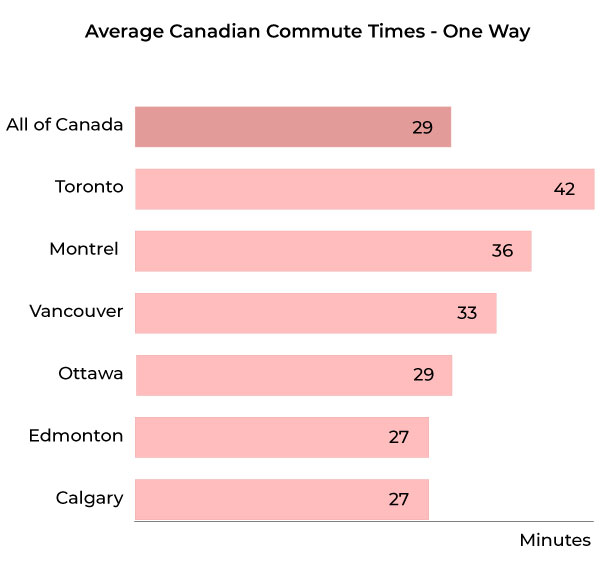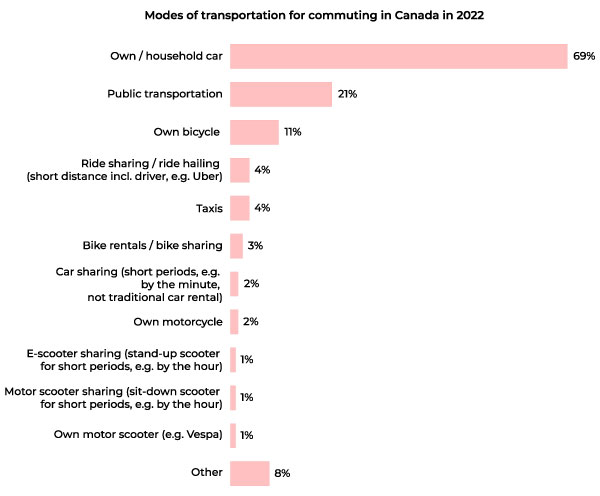⊸ Blog⊸ Does Your Commute Drive You Crazy? Commuting In Canada: Stats, Facts, Tips

Written by Kayla Jane Barrie Updated on Dec 01, 2025 7 mins read

Commuting to work is something that millions of people do each day. For some, it’s a short drive, walk, or ride on public transportation, but for many of us, especially in large urban areas like Montreal, Vancouver, Toronto and across the GTA, commuting takes up a lot of our time.
In 2016, the average Canadian spent 25.4 minutes travelling to work each way. In 2022, that number has almost tripled – on average 54 minutes of commuting each day. Even if you have a fuel-efficient vehicle you will not only see a dent in your wallet, but these longer travel times have a negative impact on mental health and general well-being for some people.
In this blog, we explore how longer commute times impact your insurance, alternative methods of travel, and statistics around commuting that will surprise you!
Your driving habits play an important role in calculating your car insurance costs. The more time you spend commuting, the higher the chance of an accident, thus higher premiums. When you are getting a quote, the advisor will likely ask how many kilometres you drive daily, weekly, and/or monthly. Depending on where you live, where you drive, and your driving habits, you could see a higher policy with a longer commute time.
Approximately 15.4 million Canadians commute to work, with 11.5 of these commuters driving. This is a lot of cars and traffic on the roads each day. Where you live has a huge impact on your daily commute. Based on the data from the Future of Work Survey, here are the average one-way commute times in large Canadian cities according to the 2016 StatsCan survey :

How do these numbers compare to commute time in U.S. cities? You may be surprised to see that some of the biggest cities in the States have lower commute times than Canada.
| State | Average commute time (in minutes) |
|---|---|
| New York | 33.4 |
| Maryland | 32.8 |
| New Jersey | 31.7 |
| Massachusetts | 29.6 |
| California | 29.4 |
| City | Average commute time (in minutes) |
|---|---|
| New York City, NY | 34.7 |
| Long Island, NY | 33.3 |
| Washington, DC | 32.8 |
| Newark, NJ | 31.1 |
| Chicago, IL | 30.8 |
Toronto has one of the longest commute times in North America, BlogTO found in December 2022. Even with the subway system, cycling routes, and streetcar, public transit in the city has become riddled with less than efficient commuting trips. Reports show that crowded subway platforms need to make the subway system safer.
Based on trips taken by TTC, GO Transit and other regional transportation providers, Torontonians spend an average of 56 minutes getting from home to work. Between trips, walking, shutdowns, detours, delays and waiting times, this number is up from 52 minutes in 2020, according to Moovit. Back in 2013, that time was 42 minutes. For those who drive, this can spike Toronto car insurance because of the high-risk factor of an accident.
In 2022, how long did you usually wait for your bus/train/streetcar to arrive? How long was your transit commute each morning? 🤔
— Moovit (@moovit) December 13, 2022
Moovit’s 2022 Global Public Transport Report is here — discover what public transit looked like in your city this year!https://t.co/mTBMUBRsU9
The last time the federal government did a full report to reflect commuting in Canada was 2016. Since then, some things have changed. Here are some additional commuting stats :
If you live in an urban area, you may have additional options to choose from for your commute other than driving. Depending on where you live in proximity to your work, major roadways, and public transportation, these viable options are worth considering :
Why consider these options? You can lower your car insurance quotes. One of the many ways that you can save on your policy is by qualifying for a low-mileage discount. Couple this with usage based insurance, and you could really lower your costs. Plus, you will have the added benefit of not having to drive daily, something that has been shown to have negative health effects.

One of the few things we think about when commuting is our health. We think about the traffic, how much time it takes up, how boring it can be, and other driving-related events like construction zones and delays.
While many of us get frustrated with our commute, especially on days when it takes longer than normal, it can impact us on a much deeper level than most realize.
According to a recent study on commuting and personal wellbeing by the Office for National Statistics in the UK, each minute added to our commutes can impact our happiness, level of stress, and overall wellbeing.
“Commuters are more likely to be anxious, dissatisfied and have the sense that their daily activities lack meaning than those who don’t have to travel to work even if they are paid more,” says Ami Sedghi and George Arnett from The Guardian.
Here are some additional ways commuting can affect your health :
While there may not be a way around your daily commute – you have to go to work – there are ways to make it more manageable, comfortable and productive. Here are some ways to get the most out of your daily commute :
You can do everything you could do if you are driving, in addition to
While you can do things to make your commute more comfortable, reducing the amount of time you spend commuting is something that probably is more important to you. Depending on your situation, you may be able to shorten your commute. Here are some tips to get started :
These are some of the ways that you can reduce your commute. Even if you can only shave off a few minutes per day, it does add up over time. Regardless of how much time you spend commuting, having dependable car insurance is important. You never know what happens during your commute, and good car insurance ensures you are prepared and covered.
Commute time is the amount of time needed to travel back and forth to work. The less you drive, the lower your Ontario car insurance can be! Keep in mind that most insurers will include the time it takes you to drive to public transit as commuting.
Commuting time is generally not considered work time for most employers. Some companies may have a commuting policy which would cover driving to and from one place in a work day.
Various studies show the ideal commute is between 15 and 20 minutes. Some commuters use the time to transition between work and home, be productive, or enjoy some time to themselves before getting home.
When you spend less time commuting and sitting in traffic, you can benefit from paying less for your policy. You can also take advantage of customizing your plan with usage-based insurance (UBI). Whether you are driving a long distance to work or you’re opting to incorporate walking or biking, be sure to let your insurer know – they can make sure you are taking advantage of all the possible insurance discounts.
| Categories | Auto |
|---|---|
| Tags | Driving TipsAuto Coverage |
Read our insurance blog to get helpful tips, information and news.
Fatal collisions in Canada rose 9.14% from 2019 to 2023. Discover the latest road safety statistics, provincial rankings, and how these trends affect your auto insurance rates.
Find out if a seatbelt ticket will raise your car insurance rates and how insurers view seatbelt violations.
Ontario’s Project CHICKADEE dismantled a $25 million auto theft ring. Discover how this massive bust targets export enablers and what it means for rising Canadian insurance premiums.
Think refusing a breath test helps your case? In Ontario, it results in a minimum fine of $2,000 and a criminal record. Compare the penalties and protect your future.